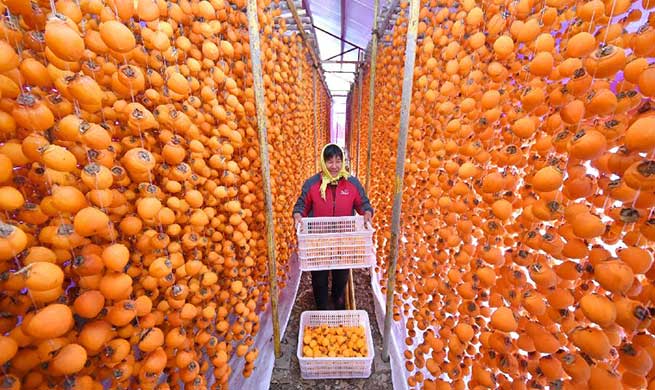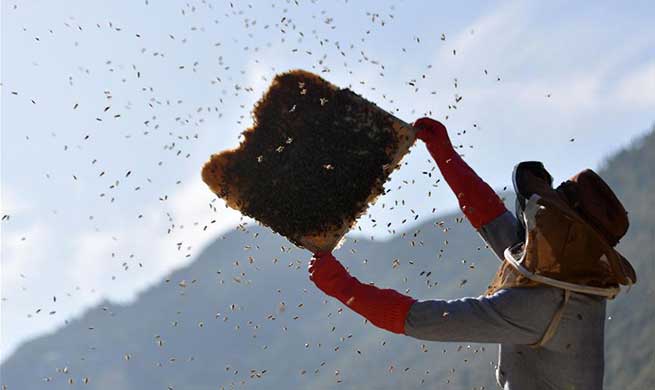by Bedah Mengo
NAIROBI, Nov. 2 (Xinhua) -- Sitting in a public bus in traffic jam along Mombasa Road in Kenya's capital Nairobi on Friday morning, Martin Andalo was getting late for his 8 a.m. appointment in the city center.
His face showed nervousness. The traffic gridlock was at a standstill with the vehicle having moved barely 50 meters in 30 minutes.
He dipped his hand in his coat pocket, fished out his phone and started fidgeting with it and soon, his face lit up, temporarily forgetting about his predicament.
Andalo then laughed, attracting the attention of some of the passengers in the public transport vehicle, commonly known as matatus.
"Someone believes this is the way Kenyans will be looking at maize flour after prices hit 1 U.S. dollar for a 2 kg pack," he said, showing a photo of a man with his two hands on his head peeping through the window.
Maize millers on Tuesday announced that prices of the commodity would rise from 0.75 dollars to a dollar, citing high operational costs.
Kenyans on social media sites Facebook and Twitter decided to make jokes out of the announcement as some faulted the millers noting that dry maize prices are at an all-time low of 15 dollars per 90 kg bag.
One of the jokes reached Andalo Friday morning, brightening his day as he sat in the vehicle getting late for his appointment due to traffic jam. Social media has become the main place where a majority of Kenyans go for comic relief as citizen post all manner of jokes.
Having a bad day in Kenya or things are not working to your expectations? Social media will put a smile on your face, seems to be the new motto for Kenyans.
From short videos, memes, photos and text messages, Kenyans creative juices flow unhindered on the social media sites.
"Class work: 2+2=4. Assignment: 3+3=6. Exam: A plane was flying North East at 450Mph. Winds blowing at 130Mph. Calculate the weight of the pilot," posted Incredibly Terrible on Twitter as citizens discussed the start of the class eight exit exams on Tuesday.
"What is thiiiiiis?" posed Benji Ndolo, a lawyer based in the capital Nairobi after seeing a funny photo of a bed in a heated debate on social media. "Kenyans, please stop, you are going to murder innocents with humour."
Vincent Musumba, a teacher in Busia County, west of Kenya, noted that social media has become a source of good laughter for Kenyans.
"Even for the worst of situations in the country, Kenyans will always make some good jokes out of it. Social media makes me laugh. There is never a dull moment on Twitter or Facebook," he said, noting he picks some jokes from the site which he uses to warm up his students while teaching maths and economics.
Bernard Mwaso, a consultant with Edell IT Solution, said that social media has offered Kenyans an unlimited platform to show their creativeness by coming up with humour even when discussing serious matters like rising cost of living or the rising public debt.
"If you want a good laugh, just go to social media and you will brighten your day," he said.
"The other day when the government announced new taxes on the internet, Kenyans came up with various humorous memes showing how they will start using their phones. They were funny but captured the seriousness of the issue," he noted.
Mwaso observed that social media offers budding Kenyan creatives, who are unable to get platforms elsewhere on mainstream media, a chance to launch their careers with great success.
"As long as you are consistent, you can post your videos there and amass a huge audience that would enable you break into the mainstream," he noted.
However, he observed that the negative side of the humour is when social media users use their creativity to troll individuals.
"It happens sometimes and this can be nasty if you are at the center of the jokes," he said.
Kenya has over 7 million social media users on Facebook and Twitter, according to 2017 estimates by Social Bakers. Majority of the users are aged between 18-24 and 25-34 years with 64 percent of them being male.
Kenya's internet subscriptions stood at 41 million in June, with 99 percent of users accessing the service via their mobile phones, according to a latest report from the Communication Authority of Kenya (CA).
CA attributed the fast growth of internet penetration to availability of affordable smartphones and cheap data bundles.
The regulator isolates growth of social media use as one of the things that have fuelled internet usage.












